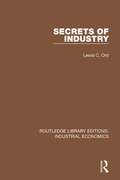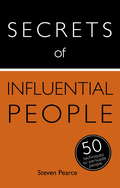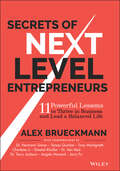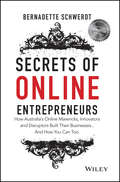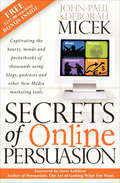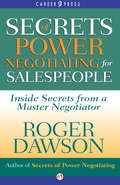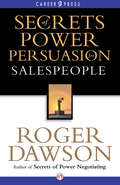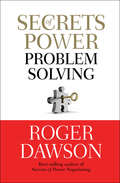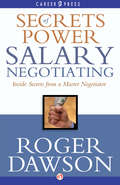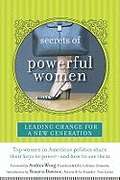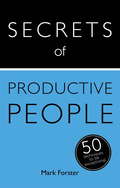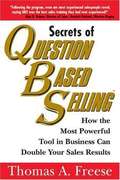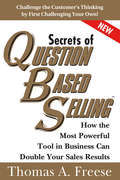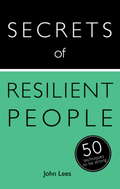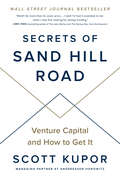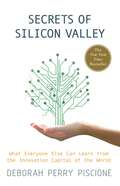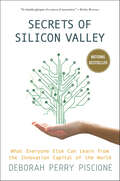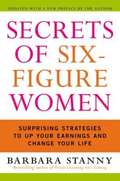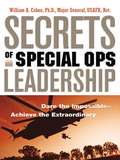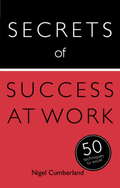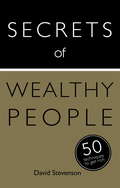- Table View
- List View
Secrets of Industry (Routledge Library Editions: Industrial Economics #30)
by Lewis C. OrdThis book, first published in 1944, examines the productiveness of British industry and the British worker, and carries out a close comparison with their American counterparts. It also studies the industries of other countries around the world and analyses industry under various political systems, including dictatorships and democracies.
Secrets of Influential People: 50 Techniques to Persuade People (Secrets of Success series #12)
by Diana Mather Steven Pearce- What do influential people know that the rest of us don't?- Do they have a secret recipe for making an impact whatever the situation?- Is there a special alchemy at work?Secrets of Influential People reveals the 50 things you need to know to make sure you get your message across in a range of contexts. Some will surprise you, and all will inspire you. Put these 50 simple strategies together and you will have a recipe for success, a proven formula that will unlock the secrets and uncover your potential.
Secrets of Next-Level Entrepreneurs: 11 Powerful Lessons to Thrive in Business and Lead a Balanced Life
by Alex BrueckmannCreate a profitable, sustainable business while improving yourself and your community In Secrets of Next Level Entrepreneurs: 11 Powerful Lessons To Thrive in Business and Lead a Balanced Life, business strategist Alex Brueckmann presents a collection of practical and insightful resources that walk you through how to grow a profitable business while maintaining a healthy and fulfilling life. You’ll learn to run your company while, at the same time, contributing to and improving a community and world we all want to live in. In the book, industry leaders offer hyper-specific and actionable advice about issues that dominate the thoughts of every business leader and owner at one point or another, from how to implement environmentally and socially sustainable practices to building high-performance workplace cultures and setting optimal pricing strategies in environments of high inflation. You’ll also find: Frequently overlooked perspectives and unfamiliar topics that hold huge value for courageous readers with open minds Strategies for prioritizing self-care while running your business, ensuring you don’t neglect yourself while you’re taking care of everyone else A philosophy that emphasizes the creation of sustainable, profitable businesses that contribute to the health of their founders, employees, stakeholders, and communitiesA singular and powerful collection of resources for entrepreneurs, founders, managers, executives, board members, and other business leaders, Secrets of Next Level Entrepreneurs will also earn a place on the bookshelves of coaches, consultants, and other professionals who serve business leaders.
Secrets of Online Entrepreneurs
by Bernadette SchwerdtDiscover the secrets of success behind Australia's top online businesses and maximise your own online potential Secrets of Online Entrepreneurs is the ultimate 'how to' guide for creating, building, and selling an online business. Packed with inspiring stories of how some of Australia's most successful online entrepreneurs built their businesses, these internet mavericks will reveal the secrets of their success and provide valuable insights into how anyone with a hobby, passion, or innovative business idea can take advantage of the vast opportunities that a global market now offers. Whether you want to build an online business from scratch or amplify your existing online presence, these hard-hitting interviews will give you the practical tools, tips, and strategies you need to fast-track your business idea and take it from concept to completion. You'll discover what industries are ready for disruption, how to spot a profitable niche, how to growth hack a database, why most online businesses fail, how to access a vast array of free tools to help you get your online idea off the ground, and much more. Most importantly, you'll discover why there's never been a better time to launch an online business. Discover the 7-step process for building an online business that will exponentially increase your likelihood of success Learn how to measure, test, and evaluate demand for an online product or service before you launch it Access the templates, cheat sheets, websites, and apps used by the entrepreneurs to build their businesses and learn how you can apply them to your business too. Don't miss this next wave of industry disruption. Get on board the internet express and snare a slice of the pie for what promises to be one of the most transformational times in business history.
Secrets of Online Persuasion: Captivating the Hearts, Minds and Pocketbooks of Thousands Using Blogs, Podcasts and Other New Media Marketing Tools
by John-Paul Micek Deborah MicekHow to master the digital media marketplace, blog for your business, podcast for profit, and more. Rarely does a communication revolution result in a marketplace transformation. The New Media Revolution is one of those extraordinary events. If you want to market better, sell more, and boost your influence in today's rapidly changing online marketplace, this is your textbook. –What the New Media Revolution is and how you can profit from it as it transforms the face of advertising and marketing forever –How to trigger powerful, word-of-mouth BUZZ with innovative New Media campaigns –Why your business blog (not mass marketing) must be at the center of your marketing strategy using New Media tools –Discover where your target audience is hanging out and captivate their attention with your persuasive message –Six key tools you must have when launching your own successful New Media Marketing Strategy –Online persuasion strategies that draw hundreds and thousands of highly qualified fans to your business, non-profit organization, or political campaign &“Just four days after following your advice, both CNN Money and The Wall Street Journal called me for an interview on the same day! Traffic to my website has since exploded, and I have so much business that I'm constantly referring clients to other consultants around the world!&”—Debra Gould, The Staging Diva, President, Six Elements Inc., Canada
Secrets of Power Negotiating
by Roger DawsonRoger Dawson's Secrets of Power Negotiating has changed the way American business thinks about negotiating. Thinking "win-win"--looking for that magical third solution in which everyone wins but nobody loses--can be a naive and ultimately unsuccessful approach in today's tough business environment. Power Negotiating teaches that the way you negotiate can get you everything you want and still convince the other side that they won also. This third edition has been completely revised and updated to reflect the changing dynamics of business today. New and expanded sections include: Twenty sure-fire negotiating gambits. How to negotiate over the telephone, by e-mail, and via instant messaging. How to read body language. Listening to hidden meanings in conversation. Dealing with people from other cultures. How to become an expert mediator.Secrets of Power Negotiating covers every aspect of the negotiating process with practical, proven advice, from beginning steps to critical final moves: how to recognize unethical tactics, key principles of the Power Negotiating strategy, why money is not as important as everyone thinks, negotiating pressure points, understanding the other party and gaining the upper hand, and analyses of different negotiating styles.
Secrets of Power Negotiating for Salespeople
by Roger DawsonIn this revised and updated paperback edition, master negotiator Roger Dawson gives salespeople an arsenal of tools that can be implemented easily and immediately to enable a quantum leap in sales.
Secrets of Power Persuasion for Salespeople
by Roger DawsonSecrets of Power Persuasion for Salespeople, now available in paperback as well as hardcover, is a powerful, easy-to-read book that delivers scores of proven, effective methods and techniques you can use immediately to achieve the power and influence over buyers you desire. This book helps you master the art of persuasion, in turn helping your sales and profits grow.
Secrets of Power Problem Solving
by Roger DawsonLet's face it: very few people have studied how to solve problems. Problems knock us down like a tsunami and we don't know what to do about it. We lie awake at night worrying about it and spend our days stressing out over a situation that only seems to get worse. It doesn't have to be that way. Roger Dawson has taught hundreds of thousands of people how to negotiate, persuade, and make decisions, with his lectures, audio programs and books, and now he has turned his attention to something that everyone needs: a way to solve life's problems. Secrets of Power Problem Solving provides proven techniques and sure-fire strategies for solving eveything the world throws at you. You'll enjoy greater success as you learn how to: Treat every problem as a golden opportunity. Make your intuition work for you. Evaluate your available choices. Create options when you see no solution. Avoid problems in the first place.
Secrets of Power Salary Negotiating
by Roger DawsonAre you earning what you're worth? Master negotiator Roger Dawson shows you how to get a better deal from your current employer and how to negotiate the best deal from a new employer. And you won't come off as greedy, overly aggressive, or selfish. In fact, you'll learn how to win salary negotiations and still leave your boss feeling like he or she has actually won! You'll also learn how to become more valuable to your employer or prospective employer, how to develop power and control over your career, and gain an amazing ability to get what you want.
Secrets of Powerful Women: Leading Change for a New Generation
by Andrea Wong Rosario DawsonIn 2008, 16 teenage girls won exclusive access to dozens of the most politically powerful women in America. These congresswomen, journalists, and activists were supposed to talk to the young women about leadership skills and how to impact public policy, but they couldn't help sharing much more.
Secrets of Productive People: 50 Techniques To Get Things Done
by Mark ForsterDiscover the 50 secrets that productive people know - complete with strategies for putting them into practice.What do productive people know that the rest of us don't? Do they have a secret recipe for success? Is there a special alchemy to being productive? The Secrets of Productive People reveals the 50 things you need to know to get things done. Each chapter outlines one of the 50 ideas and gives three strategies for putting it into practice. Some ideas will surprise you, all will inspire you. Put these simple strategies together and you have a recipe for a better life, a formula that will unlock a more productive you. Whether you want to improve your efficiency, clear your desk, or be on top of your work, this book provides the tools and techniques you need to be more productive. With dedicated sections on having a productive attitude, managing specific projects, aids to productivity and productivity in action, it gives you everything you need to know.
Secrets of Question Based Selling
by Thomas A. FreeseUnlock the secrets of Question Based Selling and see your sales soar.
Secrets of Question-Based Selling
by Thomas FreeseQuestion Based Selling ( QBS®) is a commonsense approach to sales, based on the theory that "what" salespeople ask-and "how" they ask-is more important than anything they will ever say. This technique makes sense because in order to present solutions, you first must learn your customer's needs.How do you uncover a prospect's needs? By asking questions. But not just any questions. You must ask the right questions at the right time. And this book provides a step-by-step, easy-to-follow program that does just that.With this proven, hands-on guide, you will learn to:--Penetrate more accounts--Establish greater credibility --Generate more return calls --Prevent and handle objections --Motivate different types of buyers--Develop more internal champions--Close more sales...faster--And much, much more
Secrets of Resilient People: 50 Strategies to Be Strong (Secrets Of Ser.)
by John LeesWhat do resilient people know that the rest of us don't? Do they have a secret recipe for maintaining their equilibrium during tough times? Is there a special alchemy at work? 'The Secrets of Resilient People' reveals the 50 things you need to know to survive and thrive in tough times, maintaining a positive and productive outlook whatever the circumstances. Some will surprise you, and all will inspire you. Put these 50 simple strategies together and you will have a recipe for success, a proven formula that will unlock the secrets and uncover your potential.
Secrets of Resilient People: 50 Techniques to Be Strong (Secrets of Success series #14)
by John LeesWhat do resilient people know that the rest of us don't?Do they have a secret recipe for maintaining their equilibrium during tough times?Is there a special alchemy at work?'The Secrets of Resilient People' reveals the 50 things you need to know to survive and thrive in tough times, maintaining a positive and productive outlook whatever the circumstances. Some will surprise you, and all will inspire you. Put these 50 simple strategies together and you will have a recipe for success, a proven formula that will unlock the secrets and uncover your potential.
Secrets of Sand Hill Road: Venture Capital and How to Get It
by Scott KuporWhat are venture capitalists saying about your startup behind closed doors? And what can you do to influence that conversation?If Silicon Valley is the greatest wealth-generating machine in the world, Sand Hill Road is its humming engine. That's where you'll find the biggest names in venture capital, including famed VC firm Andreessen Horowitz, where lawyer-turned-entrepreneur-turned-VC Scott Kupor serves as managing partner.Whether you're trying to get a new company off the ground or scale an existing business to the next level, you need to understand how VCs think. In Secrets of Sand Hill Road, Kupor explains exactly how VCs decide where and how much to invest, and how entrepreneurs can get the best possible deal and make the most of their relationships with VCs. Kupor explains, for instance: • Why most VCs typically invest in only one startup in a given business category. • Why the skill you need most when raising venture capital is the ability to tell a compelling story. • How to handle a "down round," when startups have to raise funds at a lower valuation than in the previous round. • What to do when VCs get too entangled in the day-to-day operations of the business. • Why you need to build relationships with potential acquirers long before you decide to sell. Filled with Kupor's firsthand experiences, insider advice, and practical takeaways, Secrets of Sand Hill Road is the guide every entrepreneur needs to turn their startup into the next unicorn.
Secrets of Silicon Valley: What Everyone Else Can Learn From the Innovation Capital of the World
by Deborah Perry PiscioneWhile the global economy languishes, one place just keeps growing despite failing banks, uncertain markets, and high unemployment: Silicon Valley. In the last two years, more than 100 incubators have popped up there, and the number of angel investors has skyrocketed. Today, 40 percent of all venture capital investments in the United States come from Silicon Valley firms, compared to 10 percent from New York. In Secrets of Silicon Valley, entrepreneur and media commentator Deborah Perry Piscione takes us inside this vibrant ecosystem where meritocracy rules the day. She explores Silicon Valley's exceptionally risk-tolerant culture, and why it thrives despite the many laws that make California one of the worst states in the union for business. Drawing on interviews with investors, entrepreneurs, and community leaders, as well as a host of case studies from Google to Paypal, Piscione argues that Silicon Valley's unique culture is the best hope for the future of American prosperity and the global business community and offers lessons from the Valley to inspire reform in other communities and industries, from Washington, DC to Wall Street.
Secrets of Silicon Valley: What Everyone Else Can Learn from the Innovation Capital of the World
by Deborah Perry PiscioneWhile the global economy languishes, one place just keeps growing despite failing banks, uncertain markets, and high unemployment: Silicon Valley. In the last two years, more than 100 incubators have popped up there, and the number of angel investors has skyrocketed. Today, 40 percent of all venture capital investments in the United States come from Silicon Valley firms, compared to 10 percent from New York. In Secrets of Silicon Valley, entrepreneur and media commentator Deborah Perry Piscione takes us inside this vibrant ecosystem where meritocracy rules the day. She explores Silicon Valley's exceptionally risk-tolerant culture, and why it thrives despite the many laws that make California one of the worst states in the union for business. Drawing on interviews with investors, entrepreneurs, and community leaders, as well as a host of case studies from Google to Paypal, Piscione argues that Silicon Valley's unique culture is the best hope for the future of American prosperity and the global business community and offers lessons from the Valley to inspire reform in other communities and industries, from Washington, DC to Wall Street.
Secrets of Six-Figure Women: Surprising Strategies to Up Your Earnings and Change Your Life
by Barbara Stanny<p>According to the Department of Labor, the average woman in 1998 was bringing home less than $25,000 a year. For every dollar that a man makes, a woman makes between 50 and 75 cents, and that is hardly news. <p>But what you may not know is that, quietly and steadily, the number of women making six figures or more is rapidly increasing. Currently, over fifteen million women make $100,000 or more, and the number continues to rise at a rate faster then for men. And these women come from every industry - psychologists, dot com founders, consultants, freelance writers, and even part-timers. <p>What makes these particular women able to do so well in the workplace? Fueled by curiosity, Barbara Stanny, author of <i>Price Charming Isn't Coming: How Women Get Smart About Money</i>, set out to research this phenomenon. What she discovered was that, though the high-earning women she interviewed came from different backgrounds and had had greatly different work experiences, they all had certain characteristics in common. <p><i>Secrets of Six Figure Woman: Surprising Strategies of the Successful High Earners</i> will be a ground breaking book for high earners who want to ensure their wealth, enhance their success, and learn from others who are in the same boat. It will also offer inspiration, guidance, and motivation to those who aspire to make more.</p>
Secrets of Special Ops Leadership: Dare the Impossible -- Achieve the Extraordinary
by William A. CohenThe Navy SEALs. The Green Berets. Delta Force. These are just a few examples of what are known as ""special ops"" -- unique fighting forces trained to beat overwhelming odds on every mission. Using principles like speed, purpose, repetition, surprise, and simplicity, elite units such as these have throughout history accomplished extremely challenging tasks against vastly superior forces. When something seemingly impossible must be achieved, special ops forces are the ones called upon for a miracle. Just as special ops are needed for critical tasks in battle, ultra-high achievers are needed for special circumstances in business: situations where time is important, when resources are low or insufficient, where you are challenging conventional wisdom or established competitors, or where crisis is imminent. But can commando techniques really work in business? If you can inspire and lead your employees to work at peak performance, they will accomplish dramatic, almost fantastic feats for you -- just as fighting commandos do in battle situations. Secrets of Special Ops Leadership reveals the essential methods commando leaders employ, using dramatic real-life stories of commando leadership from biblical times all the way up through Iraq and Afghanistan in 2005, and showing how similar techniques are used by present-day business leaders such as Steve Jobs, Mary Kay Ash, Robert Townsend, and others. You'll learn the fourteen core practices of special ops leadership, including how to: * Create the Best If you think you can just call some of your regular employees together and give them a pep talk and an impossible task to do, you're wrong. Business commandos aren't born. They must be created. Your first task as a special ops business leader is to recruit, select, train, and motivate the right people. * Build a Commando Team Using models such as Carlson's Raiders, who fought for the U.S. Marines during World War II, the book explains how to work with different personalities, agendas, priorities, and motivations to create a team that works efficiently and effectively to get the job done. * Dare the Impossible Like the Sayeret Mat'kal, the Israeli Special Ops unit that staged the miraculous raid on Entebbe to free hostages on an Air France plane hijacked by terrorists in 1976, successful business ops must aggressively seek out opportunities and know when to transcend conventional thinking to stage an assault and take action. When they've got the right problems to work on, business commandos can do many times the work of normal employees, accomplish more with less, complete projects against looming deadlines, and create innovative new products and strategies. Secrets of Special Ops Leadership gives you the ammunition you need to get a business commando unit up and running and achieve the impossible for your organization.
Secrets of Success at Work: 50 Techniques to Excel (Secrets of Success series #6)
by Nigel Cumberland- What do highly successful professionals know that the rest of us don't?- Do they have a secret recipe for success?- Is there a special alchemy at work?Secrets of Success at Work reveals the 50 things you need to know to achieve all your professional goals, whatever your ambition. Some will surprise you, and all will inspire you. Put these 50 simple strategies together and you have a recipe for success in the workplace, a proven formula that will unlock the secrets and uncover your potential.
Secrets of Success at Work: Teach Yourself (Secrets Of Ser.)
by Nigel Cumberland- What do highly successful professionals know that the rest of us don't? - Do they have a secret recipe for success? - Is there a special alchemy at work? Secrets of Success at Work reveals the 50 things you need to know to achieve all your professional goals, whatever your ambition. Some will surprise you, and all will inspire you. Put these 50 simple strategies together and you have a recipe for success in the workplace, a proven formula that will unlock the secrets and uncover your potential.
Secrets of Wealthy People: 50 Techniques to Get Rich
by David StevensonWhat do wealthy people know that the rest of us don't? Do they have a secret recipe for success? Is there a special alchemy to make it work? The Secrets of Wealthy People reveals the 50 things you need to know to build your wealth, capital and investments. Some will surprise you, and all will inspire you. Put these 50 simple strategies together and you have a great recipe for a better life, a formula that will unlock the secrets and uncover your potential.
Secrets of a Freelance Writer: How to Make $100,000 a Year or More
by Robert W. BlyThe definitive guide to becoming a successful freelance writer, now in an updated and expanded third editionSecrets of a Freelance Writer has long been the authoritative guide to making big money as a commercial freelance writer. In this new edition, you'll find out how to make $100,000 a year—or much more—writing ads, annual reports, brochures, catalogs, newsletters, direct mail, Web pages, CD-ROMs, press releases, and other projects for corporations, small businesses, associations, nonprofit organizations, the government, and other commercial clients.You'll also learn how to start out as a freelancer, market yourself to clients, create a successful personal Web site to cull more sales leads, follow up on potential customers to build your practice, and run your business on a day-to-day basis. Secrets of a Freelance Writer is the definitive guide to building a successful and lucrative freelance writing practice.
